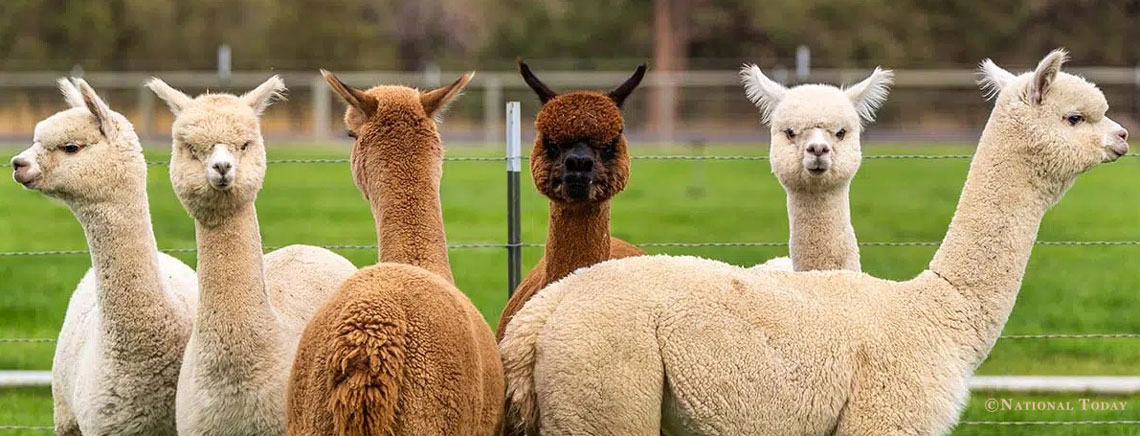Fluff Alpaca
Sometimes an avocation becomes a vocation—and sometimes that vocation takes over your life.
Suzanne Werner, a lawyer and lifelong knitter, had always wanted to live in the Berkshires and to own a farm. When she and her husband, Robert, found an 80-acre farm, replete with forest and pastures along the pristine Green River in Hillsdale NY she could feel her future calling.
She left the cold technicalities of the law for a cozy second career raising alpacas and selling products made from their incredibly soft and warm fleece. Werner and her husband have now been joined by other family members in marketing alpaca products in their store, Fluff Alpaca, a thriving endeavor on Main Street in Great Barrington.
Their children, Emma, Jamie and Nathaniel, are involved with both the store and farm. The result has been a dynamic team that feels passionately about local artisans, the importance of agriculture in the Berkshires and Hudson Valley and—you guessed it!—alpacas.
“We’re super lucky that we have a family that works so well together, said the Werners’ son, Jamie. “We have a small, tight team.”
Others also contribute to the effort. “My grandma always knit things, beautiful booties and hats when we were kids,” Werner said. “She is now knitting things for the store. I like that connection with my childhood.”
Suzanne Werner first became interested in establishing a fiber farm after going to the Dutchess County Sheep and Wool Festival “I fell in love with the idea of taking something from the land to the needle to a shop,” she said in an earlier interview.
“We originally were looking at sheep,” her son explained, “but when we researched raising sheep we found it can be kind of hard to keep them alive. Then my mother met someone with an alpaca farm.”
The farm the Werners purchased now has a small herd of 15 alpacas as well as a llama, a couple of Icelandic horses and the requisite chickens, cats and dogs. The primary product of the farm is alpaca fiber which is spun into yarn and hand knit into many of the items sold at Fluff Alpaca.
“It is a lot of work to care for 15 alpacas,” Werner said. “Mom is the real farmer but on shearing day, it’s all hands on deck.”
Alpacas, with their large, luminous eyes, long necks and fluffy chapeaus seem to invite hugs but Werner says they can be “a little stand-offish.” They are less likely to spit than their llama cousins, but he admits that “on shearing day, you might get caught in the cross-fire.”
Once the animals have been freed from their dense fleeces and made more comfortable for the hot summer month, the fiber is sent to processing mills and is returned as yarn sold in the store and also distributed to talented hand-knitters in the region.
Other products for the store are purchased from Peru or Bolivia where the animals have been domesticated for centuries. “They have been working with the fiber so long, they are the experts,” Werner said. “We have a nice mixture of local and international items.”
Werner said there are many advantages to alpaca farming. In an era when sustainability has become a byword in agriculture, alpacas are considered some of the most eco-friendly farm animals. The bottoms of their feet have soft pads that don’t pack down the earth; a member of the camelid family, they drink less water and they do not require monoculture foods to graze on. “Alpacas are pretty self-sufficient. They are really suited for a world where people are being more responsible,” said Werner.
The products made from their fleece are similarly earth-friendly. Alpaca fiber is “a super-soft, super-light, semi-hollow fiber,” that, compared to wool, “is a warmer and more breathable alternative,” according to Werner.”
“Try our socks,” he urged. “It’s a strong fiber, warm and antimicrobial. It’s really a miracle fiber. We’re so used to quicker fashion these days, to buying something and wearing it for a little while until it wears out. Alpaca is little pricier but if you take care of it properly it will last 20 years.”
Goods range from socks at $15, to booties for newborns at $35, to scarves and gloves at under $100. Coats cost $400 to $500 and a basic throw can be had for about $145.
Fluff Alpaca first opened in Hudson NY but moved to Great Barrington about a year ago. “It was a big risk because we were doing well in Hudson,” Werner said, adding that a couple of factors—including distance from the farm—prompted the move.
“It’s been awesome in Great Barrington,” he said. “We love the town and are super-grateful that we have been received so well.”
Great Barrington is, of course, a destination town but for those who may live at a distance, the store offers online ordering. Because it is a boutique with items that are hand-knitted and sourced from different vendors, those ordering are welcome to call with questions about sizes. “If they can, it’s best to come to the store. Touching is still our best sales practice,” he said. “But if they can’t come and have questions, we are super into customer service.”
Fluff Alpaca is located at 319 Main Street in Great Barrington; 413-429-4770, info@fluffalpaca.com. It is open Sunday, Monday, Wednesday and Thursday, 11 AM-5 PM; and Friday and Saturday, 11 AM-6 PM.


